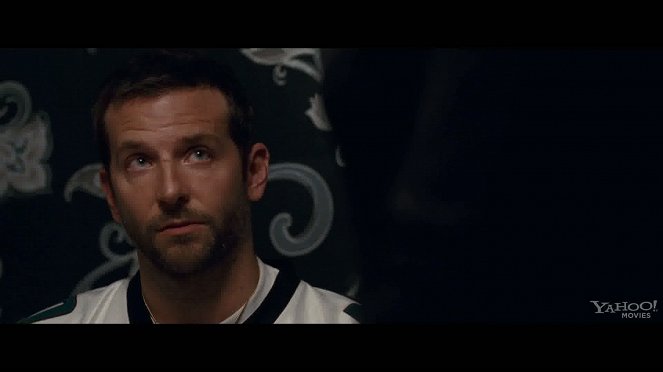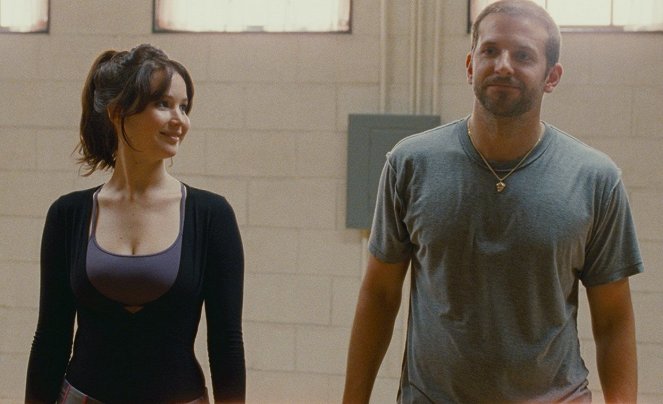Directed by:
David O. RussellScreenplay:
David O. RussellCinematography:
Masanobu TakayanagiComposer:
Danny ElfmanCast:
Bradley Cooper, Jennifer Lawrence, Robert De Niro, Jacki Weaver, Chris Tucker, Anupam Kher, John Ortiz, Shea Whigham, Julia Stiles, Paul Herman, Dash Mihok (more)VOD (3)
Plots(1)
Academy Award-winning romantic comedy based on the novel by Matthew Quick. Bradley Cooper stars as Pat Solitano, a former high school teacher fresh from a stint in a mental institution who moves back in with his parents in an ill-fated attempt to reconcile with his ex-wife. His life begins to come together at last when he meets Tiffany (Jennifer Lawrence), a recently-widowed amateur dancer with problems of her own, and also begins to reconnect with his obsessive-compulsive father, Pat Sr (Robert De Niro). (Entertainment in Video)
(more)Videos (29)
Reviews (11)
Who is crazy? And who is normal? I rather feel that the crazy person is in all of us, the question is, what, who and how activates it. In this movie Jennifer Lawrence and Bradley Cooper activated it before the story began and I see only the therapy. I have to say, it was really nice to watch. Especially Jennifer Lawrence and especially when she was twisting during the dancing. Nevertheless, I really have to admit that I haven’t seen such unique romantic movie in a really long time. Properly crazy, honestly funny and realistic in the way only life can be.
()
A great romantic comedy, the best for the past... a really long time. Very untraditional, argumentative and full of paradoxical situations. Bradley Cooper is excellent (well-deserved nomination) and Jennifer Lawrence (well-deserved nomination) is the perfect psycho fox with a sensitive soul. Notwithstanding the unarguable qualities of the main duo, De Niro (well-deserved nomination) rocks the most. An unpredictable, cute, but unintrusive movie that you can take a girl to and rather than the date turning bitter, you will more likely be treated to a sweet dessert.
()
The protagonists of screwball comedies acted crazy. The protagonists of Silver Linings Playbook are crazy. Of course, within the boundaries of American indie romances, i.e. they are characters with eccentric behaviour and minimal psychological depth, and they are defined only by their interactions with their immediate surroundings. He loses his nerve here and there, she has nymphomaniacal tendencies, and both of them have lost someone. Now they need to emotionally fill up the vacant space and find their lost balance (for example, in dancing). It’s not necessary to know more than that to understand the story and to get a good feeling in the end. Russell placed his bets on good actors and sharp verbal exchanges, so it’s not surprising that the film’s highlights include the scene in which several mentally unstable characters shout at each other in front of a shaky camera. However, this is just another display of “shaky cam” syndrome. The nervous camerawork is used in line with Pat’s gradually subsiding uneasiness. The scenes with the psychiatrist are calmer and the camera movements gain a certain harmony with the gradual coming together of the central couple, which, however, has long been motivated by selfishness, so a certain nervousness and uncertainty persist. In other scenes, the camera points out what the characters realise only later (the reading of the letter), thus creating tension and raising expectations, which at least make the path to the predictable ending more enjoyable. It’s pleasing that, unlike many contemporary comedies, the film isn’t made up only of scenes and one-liners and that it also has a carefully thought-out structure (a vaulted dramatic arc, if you like), without dead spots and with a climax in which all of the motifs are conscientiously put to good use. The fact that the protagonist doesn’t have his behaviour fully under control and that he has to learn how to dance because of his “treatment” does not in any way weaken the thoroughly androcentric narrative (we barely get to know Tiffany’s parents; Pat’s parents condition the denouement), and in other respects the screenplay is revisionist only in relation to screwball comedies. Social norms are undermined by the transfer of the treatment process from the institutional context to the outside world, or rather the denial of the dichotomy between “normality” and “madness”. Unlike with classic screwball comedies, the realistic context here (treatment facility, pills, aggression) make us aware that the characters behave differently than is customary in their world. However, neither one of them has to enter a more normal world. In other words, everyone is crazy; it’s just a matter of finding the right one. 75%
()
For some, Silver Linings Playbook will be a barking drama where characters merely argue, shoot diagnoses at each other, and search for happiness through priorities that are not entirely understandable. For me, Playbook is a confession, an awakening, the power of life, and a shouted desire for happiness. If I were so bold as to say that at the end of the movie, I was feeling that no matter what happens, I've got a chance to prove what is most important to me in life, it would sound like the most worn-out cliché. But it was Pat and Tiffany who got me into this sincere mood – from the first monologue to the captivating ending.
()
I'm going to be harsh and lean towards a lower rating, because as a whole this film didn't quite make the best impression on me. In terms of the acting there’s nothing to fault, but in terms of content it's pretty empty. I was bored at times, then the rush of emotions made my head spin. The only thing I really liked were the dance scenes. 3.5 stars.
()



Ads